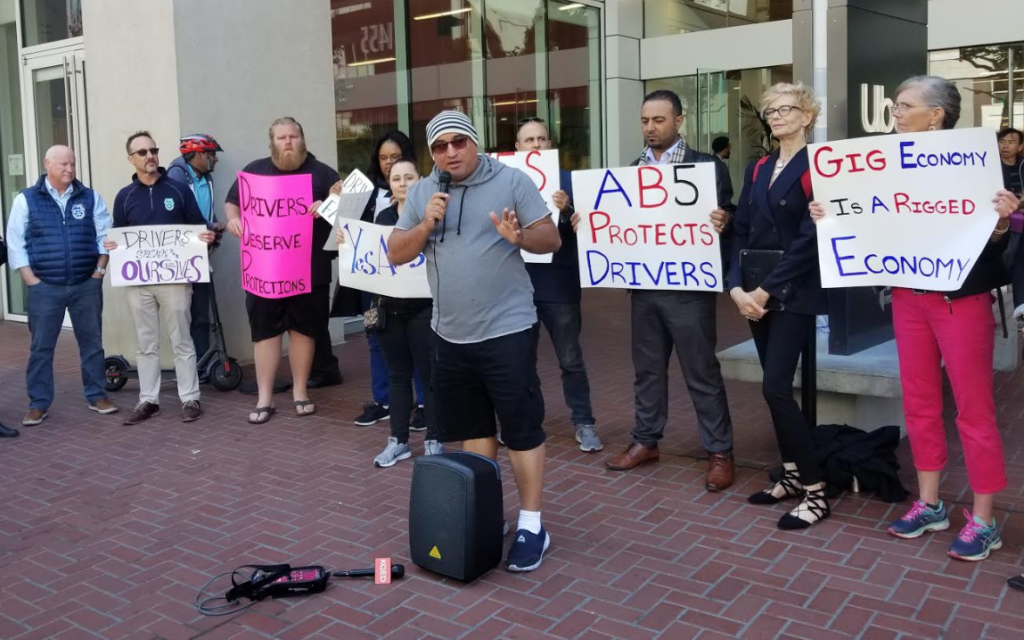The gig economy, a market where anyone can take work as an independent contractor, has facilitated the rise of many ride-hailing and food delivery companies like Uber and Doordash, among others. These companies have created a system where almost anyone can sign up and work whenever they want using their apps. “Side-gigs”, have become increasingly popular as costs of living rise and everyone could feel a little better making some extra money. Companies like Uber market themselves this way to attract potential workers; Uber’s website boasts “Make Money on Your Schedule”.
However, gig-economy companies have faced a challenge to their business model recently. California’s Assembly Bill 5, which aims to properly classify workers as employees, who may have been previously treated differently, has sparked debate with regards to companies like Uber. These companies classify their workers as independent contractors, which allows them to not provide common employee benefits. While certainly better for the corporate bottom-line, Uber drivers and other gig-economy workers who do their work full time may feel cheated.
Even more so, a gig-economy worker who is classified as a contractor would not be entitled to unemployment insurance, should they be laid off or the company goes out of business. Finally, a full time Uber driver lacks a pension, harming their future planning.
The number one argument in favor of giving gig-economy workers employee status is the reality that many gig-workers work part-time or even full-time hours, without a minimum wage. In many places the workers who take on freelance jobs like Uber are not guaranteed a minimum wage as regular employees would be, leading to uncertainty and unreasonably long hours just to make ends meet. In the case of Uber drivers, a report from the Economic Policy Institute classified them in the lowest ten percent of paid American workers. The gig is low pay and not even guaranteed – a dangerous combo. While the argument could be made that these gig-economy companies do not intend for their workers to use their apps as full-time jobs, the reality is that they rely on those who do.
In the case of Uber drivers, a report from the Economic Policy Institute classified them in the lowest ten percent of paid American workers. The gig is low pay and not even guaranteed – a dangerous combo.
While only a fraction of Uber drivers work full-time hours, these drivers account for approximately half of all rides. Furthermore, many ride-hailing or food delivery workers have to account for time waiting. Orders come and go, and as the saying goes: time is money. If a driver or delivery worker has to wait – unpaid – their earnings are hindered and they must work longer to compensate for this. In contrast, a pizza shop’s delivery driver is paid regardless of how many orders the shop gets. By withholding their employee status, gig-economy companies are withholding a guaranteed minimum wage for the workers who maintain the core service of the company.
Aside from the importance of a guaranteed minimum wage, there are a plethora of other benefits most employees enjoy. For instance, Uber drivers work within a car all day, and may experience back-pain or other injuries you can sustain from sitting for extended periods of time. The difference is that they would have no workers’ compensation should something arise. Even more so, a gig-economy worker who is classified as a contractor would not be entitled to unemployment insurance, should they be laid off or the company goes out of business. Finally, a full time Uber driver lacks a pension, harming their future planning. The numerous support systems that allow at least some sense of comfort to the average employee, are lacking for a full time gig-economy worker.
Overall, it’s an undoubted notion that a gig-economy worker who truly treats work as a side-gig to supplement their main income, should not necessarily be treated as an employee. However, the workers who sustain these companies do work full-time, and they should not be deprived of their rights as full time employees. Pair up a low and volatile income with a complete lack of benefits, and it becomes clear that something has to change for full-time gig workers.








